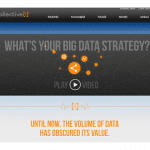Big data is disrupting the world, society and all industries. One industry that will definitely notice these waves of change is the market research industry. The new big data startups, that are founded everywhere around the world, can be viewed as the new, but improved, market research agencies. Consequently, the market research industry as we know it today will seize to … [Read more...] about Will Big Data Mark The End Of The Market Research Industry?
Big Data
Learn everything you need to know about big data. Find out how companies are using this revolutionary technology and what it means for your business strategy.
Big Data Startup Algoritmica Builds Algorithms for Companies
Company Algoritmica Address Padualaan 8, 3584 CH Utrecht, The Netherlands Founders Koen Havlik, Tim Salimans & Mark-Jan Harte Founded November 2011 Funding 0 Employees 4 Website www.Algoritmica.nl Rating 7 bits Algoritmica, a Dutch big data startup, started combining predictive analytics algorithms in order to build predictive models in November 2011. … [Read more...] about Big Data Startup Algoritmica Builds Algorithms for Companies
Rabobank Learned Valuable Big Data Lessons Thanks to Proof of Concepts
Rabobank started with big data in March 2011. After they named the big data trend one of 10 most important trends in their IBA ICT Trends prediction. In the prediction of 2013 trends, the big data trend was positioned at number 6 of ICT trends. As part of practice what you preach, the Rabobank started with developing a big data strategy in July 2011. They created a list of 67 … [Read more...] about Rabobank Learned Valuable Big Data Lessons Thanks to Proof of Concepts
Collective[i] Uses Big Data To Give Business Leaders Answers
Company Collective[i] Address 130 Madison Ave New York, NY, 10016 USA Founders Stephen Messer, Heidi Messer & Tad Martin Founded 2007 Funding Unknown Employees 35 Website www.collectivei.com Rating 6 bits Collective[i] is a Software-as-a-Service provider that helps business leaders answer their toughest question with big data applications. Co-founder … [Read more...] about Collective[i] Uses Big Data To Give Business Leaders Answers
Catalyst IT Services Hires Big Data To Do The Job
Catalyst IT Services is a technology outsourcing company from Baltimore, USA. Catalyst IT Services has screened more than 10.000 candidates in the past years. Screening each of those candidates by hand would have been a daunting process that would require a lot of employees and thus money. Founder of Catalyst IT Services, Michael Rosenbaum, came up with a big plan to change the … [Read more...] about Catalyst IT Services Hires Big Data To Do The Job
What is big data?
Big data is a term that refers to the massive amount of digital data created and shared every day. Big data can transform how we live, work, and communicate. It can be used to improve everything from public health and urban planning to business and marketing.
Big data is also changing the way we think about privacy and security. The volume, velocity, and variety of big data present challenges and opportunities for organizations and individuals. Regardless, big data is here to stay, and its impact will only continue to grow in the years to come.
What is big data analytics?
Big data analytics is the process of turning large, complex data sets into actionable insights. Businesses use various analytical tools and techniques, including machine learning and statistical analysis, to do this.
Big data analytics can be used to improve decision-making in areas like marketing, operations, and customer service. It can also be used to identify new business opportunities and optimize existing processes. With the help of big data analysis, businesses can gain a competitive edge by using their data better.
Want to learn more about big data? Datafloq has courses available. Contact us to get started.
When was big data introduced?
The term big data was coined in the 1990s, with some giving credit to John Mashey for popularizing the term. However, the concept of big data has been around for much longer.
Where does big data come from?
In the early days of computing, scientists and businesses began to realize that the amount of data being generated was increasing exponentially. As a result, they began to develop new methods for storing and processing data.
Over time, these methods have become increasingly sophisticated and have played a key role in enabling businesses to make sense of vast amounts of information. Today, big data is used in various industries, from retail to healthcare, and its importance is only likely to grow in the years to come.
What are examples of big data?
One of the most common examples of big data is social media data. With over 2 billion active users, Facebook generates a huge amount of data every day. This includes information on user interactions, posts, and even location data. Analyzing this data can help companies better understand their customers and target their marketing efforts.
Another example of big data is GPS signals. These signals are constantly being generated by devices like cell phones and fitness trackers. When combined with other data sets, GPS signals can be used to provide insights into everything from traffic patterns to human behavior. Finally, weather patterns are another type of big data set. By tracking these patterns over time, scientists can better understand the impact of climate change and develop strategies for mitigating its effects.
How do companies use big data?
Companies use big data in marketing, product development, and customer service. By analyzing large data sets, businesses can identify patterns and trends that would be otherwise difficult to spot. For example, a company might use big data to track customer behavior patterns to improve its marketing efforts.
Alternatively, a company might use big data to improve its products by identifying areas where customers are most likely to experience problems. For instance, big data can be used to improve customer service by finding pain points in the customer journey. Ultimately, big data provides companies with a valuable tool for gaining insights into their business operations.







